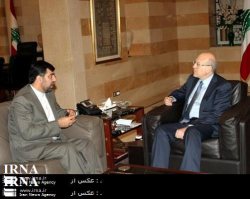ID :
236323
Tue, 04/17/2012 - 09:28
Auther :
Shortlink :
https://www.oananews.org//node/236323
The shortlink copeid
Roknabadi Elaborates On Lebanese PM's Comments On Abu Mousa

Beirut, April 17, IRNA – Iranian Ambassador to Lebanon Ghazanfar Roknabadi here Monday elaborated on Lebanese PM Najib Mikati's comments on President Mahmoud Ahmadinejad's recent visit of Iranian Abu Musa Island.
Speaking to IRNA, Roknabadi called the holding of first Joint Economic Committee of the Republic of Lebanon and the Islamic Republic of Iran on April 30 to May 3 as the main subject of his meeting with Mikati.
“The meeting will be held for the first time and Iran’s First Vice President Mohammad Reza Rahimi and Lebanese prime minister are scheduled to attend the meeting,” Iranian envoy stated.
Pointing to the release of a false statement by the Office of Lebanese’s Prime Ministry in case of content of his meeting with Mikati, Roknabadi rehected as false news the latest propaganda by the hostile western media outlets and their claims about Mikati's criticism of Iranian president’s visit to Abu Musa Island and the content of president Mahmoud Ahmadinejad’s speech there.
Roknabadi noted that Lebanese prime minister had assured him that the Office of Lebanese Prime Ministry will correct its statement.
Hostile media outlets used the opportunity and released in widespread a wrong deviated statement from the Office of Lebanon Prime Ministry.
Hostile propaganda machines claimed that the prime minister of Lebanon had told Roknabadi in their latest meeting that Ahmadinejad's comments during a visit to Abu Musa Island 'inflame the ongoing conflict in the region, at a time when we require awareness to strengthen the calm and security that reflect positively on all countries of the region and contribute to their development.”
On Wednesday, president Ahmadinejad visited Iranian Abu Musa Island, a move that immediately sparked criticism from some Arab countries and the recall of UAE's ambassador to Iran.
The hostile media outlets had also claimed that Mikati had expressed surprise at Ahmadinejad's comments about the predominance of Iranian civilization and culture throughout the ages, saying that 'Arab civilization has long spread its culture in the countries of the region'.
Iran and Lebanon have actively pursued positive relations since the Islamic Revolution in 1979. Following the formation of the Islamic Republic, Iran’s revolutionary leader, including Imam Khomeini declared his support for oppressed people of Lebanon against Zionist regime.
As of 2011, the Lebanese government is dominated by Hezbollah and its allied bloc. In recent years, the governments of Iran and Lebanon have taken additional steps to enhance economic and diplomatic cooperation. Since assuming office in 2008, Lebanese President Michel Suleiman has been notably active in encouraging bilateral ties, personally meeting with several high-ranking Iranian officials, including the president. In 2011, Suleiman appointed Hezbollah-supported Najib Mikati as Lebanon’s prime minister.
Iranian and Lebanese officials have held several meetings since 2009 to discuss economic issues of mutual concern. Most recently, the two allies inked a 50 million Memorandum of Understanding to increase cooperation in the energy sector.
Lebanon has been supportive of Iran’s nuclear program, stressing that it views Iran’s program as peaceful. The Lebanese government has urged a diplomatic resolution to the ongoing conflict between the Islamic Republic and the international community over its nuclear efforts. In 2010, Lebanon abstained from voting on a UN Security Council Resolution calling for additional sanctions on Iran./end





